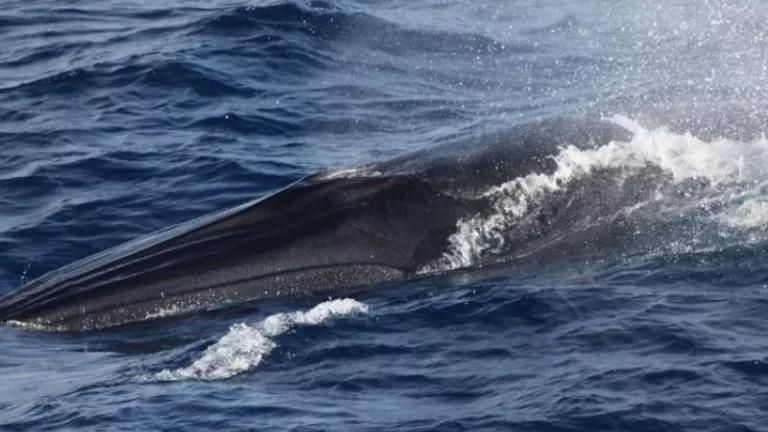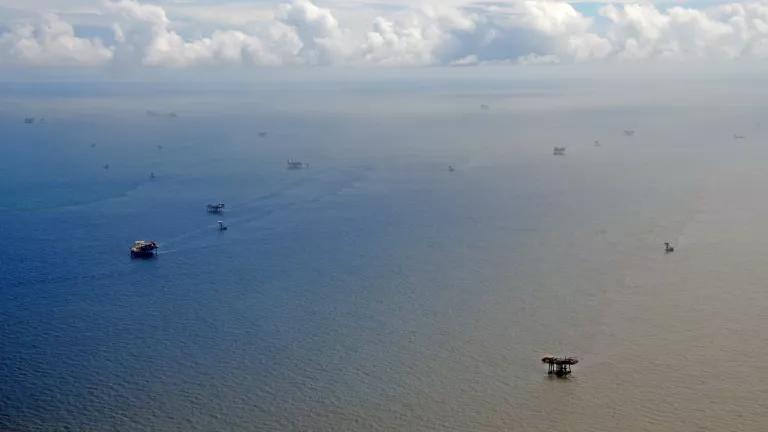Trump’s Plan to Protect U.S. Fishermen Must Go Further

There is one bright spot in an Executive Order (EO) the Trump Administration released last week on fishing and U.S. seafood—it recognizes the negative impact of illegal, unreported, and unregulated (IUU) fishing, which depletes fish populations, damages ecosystems, and takes a horrific human toll. Prioritizing this issue will help U.S. fishermen, consumers, and our oceans. The order, however, should have done more to meaningfully strengthen the U.S. response to IUU fishing. And, as my colleague Molly Masterton wrote last week, other aspects of the order roll back safeguards for the ocean environment and will hurt US fishermen more than help them.
Despite international efforts to curtail IUU fishing, it is still responsible for as much as 30 percent of the global seafood harvest. Since the U.S. is the world’s largest importer of seafood, much of that illicit catch ends up here, and Americans’ appetite for seafood and our lax enforcement of laws to stop it help drive these bad practices. Since IUU fishing is cheaper than complying with regulations, it leads to artificially depressed seafood prices—meaning that that law-abiding U.S. fishermen are not earning as much as they should be. Stamping out IUU fishing is a key way to compensate U.S. fishermen fairly.
The EO calls for NOAA to propose a rule to further implement the Port State Measures Agreement (PSMA), an international treaty that allows nations to deny port privileges to fishing vessels involved in IUU fishing. Under the EO, NOAA must also prioritize capacity building and technical assistance to other nations to stop IUU fishing, and improve interagency coordination. Working with nations that source seafood is a key piece in the fight to end illegal fishing, so this commitment in the order is welcome, and will pay off, if it yields investments in NOAA and other agencies that are key to the seafood import process. While the administration’s recognition of these needs is important, the Maritime SAFE Act, which passed last year, also calls for support for PSMA implementation and technical and capacity building in source countries. In other words, the IUU provisions of the EO are nothing new.
An administration that truly wants to combat IUU fishing could do much more, by looking more closely at the U.S. seafood market and the ports of entry that allow IUU seafood to enter our borders.
There are three major steps the United States must take if we are serious about being a global leader in stopping IUU fishing and protecting U.S. fishermen:
1. Strengthen the U.S. seafood traceability program.
In 2017, NOAA launched a program called the Seafood Import Monitoring Program (SIMP), intended to be a critical tool in closing U.S. markets to IUU seafood. By requiring full traceability for 13 species of seafood imports, the program should help NOAA enforcement agents locate and block IUU seafood imports from U.S. commerce.
This is a promising tool, but NRDC and other groups have made a series of recommendations for improving SIMP, with an emphasis on strengthening its implementation. The SIMP would be more effective if it required seafood importers to provide key information linking vessels to a seafood shipment. Two examples are the Authorization to Fish, the permit or other documentation demonstrating a vessel operator has official permission for their commercial fishing activity, and the Unique Vessel Identifier that helps track vessels regardless of name-changes, or other attempts to conceal identities. As NOAA is currently implementing the program, not all importers who have this information must report it—despite the SIMP Final Rule saying that these fields are required at the time of entry.
Actors all along the seafood supply chain also need more guidance from NOAA on how to comply with the program, particularly those overseas. Further, NOAA must modernize its import computing system so that it can automatically flag shipments that are at high-risk of IUU fishing. Finally, the SIMP should be expanded. It should include all imported seafood species, not just the 13 “priority” species currently covered. Right now, just 40 percent of imported seafood is included in the program. But, IUU fishing and seafood fraud are pervasive problems that exist in virtually all foreign fisheries; they are not limited to the few species the SIMP currently covers.
2. Improve interagency and federal/state collaboration and risk analysis and build U.S. capacity for IUU investigations.
NRDC analyzed the U.S. seafood import system and interviewed a number of agency experts and officials stationed at three U.S. ports (report expected summer 2020). We found that the state and federal agencies charged with counter IUU enforcement can work at cross-purposes. Poor communication and information-sharing interfere with effective IUU investigations. Improving the partnerships, communication, and coordination among these different federal and state agencies—which have distinct and crucial roles to play—is essential to blocking IUU-fished shipments.
The United States also needs to invest in a major increase in the personnel needed to inspect, screen, and investigate seafood shipments to interdict IUU shipments before they enter the country. Current staffing levels are grossly insufficient. For instance, the Ports of Los Angeles and Long Beach—together the largest port complex in the United States—have only two NOAA enforcement agents to monitor all the seafood imports processed through the ports. For context of the task at hand, nearly a third of the 5.8 billion pounds of edible seafood imported into the United States comes through that one port complex.
This lack of on-the-ground inspection and enforcement means there is little to stop IUU products from coming into the country. NOAA needs more law enforcement personnel on the ground, specifically trained in detecting IUU-fished seafood. Several high-profile interdictions could have a major deterrent effect.
3. Strengthen the High Seas Driftnet Fishing Moratorium Protection Act to better define IUU fishing and target countries engaged in it.
This act requires NOAA to compile a list of nations engaged in IUU fishing and other harmful practices. Under the act, nations that receive negative certifications can face trade restraints and other penalties.
The High Seas Driftnet Act could be a powerful tool to discourage countries that engage in these practices, but, as NRDC’s Irene Gutierrez notes, its implementation needs improvement. Currently, NOAA focuses too narrowly on violations in U.S. waters, and the actions of individual vessels, rather than the overall record of each country. This makes it difficult to determine whether nations are making real commitments and progress toward ending IUU fishing in their fleets.
The definition of IUU fishing should be expanded to include related human rights abuses at sea and harmful fishing practices wherever they occur. There should also be more communication between NOAA, Customs and Border Protection, the Departments of State and Labor, and other relevant federal agencies to help better target IUU fishing and labor violations.
Another strategy to stop IUU fishing would be to explicitly make IUU fishing a predicate offense under statutes like the Racketeering Influence Corrupt Organization Act (RICO) and other laws that penalize organized crime and other illegal activity.
Americans love seafood—but U.S. consumers shouldn’t have to wonder if they are contributing to human rights abuses, habitat degradation or overfishing when they buy seafood. If the Trump Administration really aims to throw U.S. fishermen a lifeline during this unprecedented public health crisis, it must take more concrete steps to stop IUU fishing.
Illegal, unreported and unregulated fishing hurts American consumers, American fishermen, the health of fisheries and the marine environment. If the United States is serious about stopping the import of IUU seafood, it needs to take serious action that goes far beyond what is recommended in Trump’s Executive Order.
Dan Radmacher contributed to this post.




